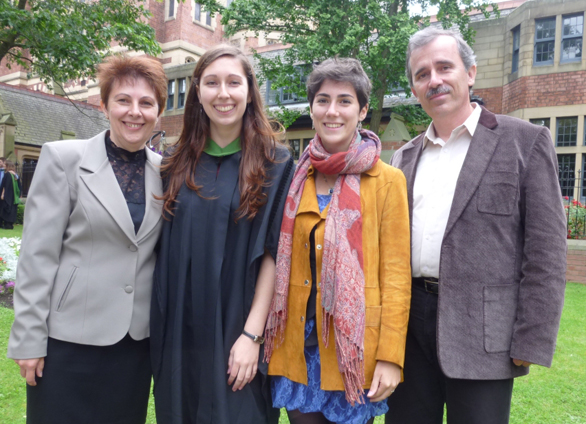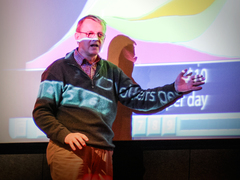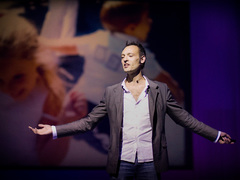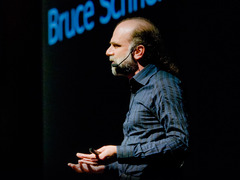
TED Talks are available in 94 languages, from Albanian to Vietnamese, thanks to the tireless work of our translators. So far, more than 8,500 volunteers have created the upwards of 33,500 translated talks. To celebrate this accomplishment, every week the TED Blog is bringing you a Q&A with one of our most prolific translators. Today, meet Laszlo Kereszturi, pictured above right, with his family.
Where do you live? And what do you do by day?
I live in Oradea, Romania, and I work as an information security professional at a telecommunication company. I translate in Hungarian and Romanian.
What drew you to TED?
Due to my job and my living place, I have feel a lot of negative emotions every day. Before 2006, I escaped in the realm of science-fiction — but watching TED Talks has proved to be a better way. TED Talks are about positive ideas, people with real great initiatives, happening now — not in the distant future. And since 2009, when TED OTP made it possible to translate TED Talks, I am truly happy that I can contribute.
What was the first talk you translated and how did you pick it?
 Hans Rosling: The best stats you've ever seen
My first talk was “Hans Rosling shows the best stats you’ve ever seen“. This talk just found me; I knew I had to translate it after watching the first five minutes. “Robert Lang: The math and magic of origami” was the second talk I translated. I knew about the art of origami before, but its implications in real life — from space exploration to medicine — were very worth sharing in my language.
Hans Rosling: The best stats you've ever seen
My first talk was “Hans Rosling shows the best stats you’ve ever seen“. This talk just found me; I knew I had to translate it after watching the first five minutes. “Robert Lang: The math and magic of origami” was the second talk I translated. I knew about the art of origami before, but its implications in real life — from space exploration to medicine — were very worth sharing in my language.
What have been your favorite talks to translate? Why?
“John Hodgman: Aliens, love — where are they?” because it is funny in a clever way.
 Bernie Dunlap: The life-long learner
Its final part really moved me. I also enjoyed “Ben Dunlap: The life-long learner“, because it presents his personal experience with Hungarian people and is just a great story. And “Joseph Pine: What consumers want“, because this was the first TED Talk I ever saw and is about being authentic. I have dozens of favorite talks, but I’ll stop there for brevity’s sake.
Bernie Dunlap: The life-long learner
Its final part really moved me. I also enjoyed “Ben Dunlap: The life-long learner“, because it presents his personal experience with Hungarian people and is just a great story. And “Joseph Pine: What consumers want“, because this was the first TED Talk I ever saw and is about being authentic. I have dozens of favorite talks, but I’ll stop there for brevity’s sake.
Which talk was the most difficult for you to translate and why?
I’ve translated talks on a wide range of subjects
 Steve Keil: A manifesto for play, for Bulgaria and beyond
and have deliberately chosen many difficult ones. A good translation takes time — you can’t rush it. Difficult translation for me means that I have a very short deadline, or the process took too long.
Steve Keil: A manifesto for play, for Bulgaria and beyond
and have deliberately chosen many difficult ones. A good translation takes time — you can’t rush it. Difficult translation for me means that I have a very short deadline, or the process took too long.
The most difficult translation was exactly the one I expected to do in a very short time, for a TEDx event: “Steve Keil: A manifesto for play, for Bulgaria and beyond“. It’s not a difficult talk and I had already translated it in Romanian, so it looked like an easy job. But it wasn’t, because I had to do it during the week, after work.
 Bruce Schneier: The security mirage
Another talk that was hard to translate was “Bruce Schneier: The security mirage“. It’s about information security, so shouldn’t have been hard for me. But my knowledge about the talk’s content made me very careful when choosing the words and the “diamond polishing” process took more time than usual.
Bruce Schneier: The security mirage
Another talk that was hard to translate was “Bruce Schneier: The security mirage“. It’s about information security, so shouldn’t have been hard for me. But my knowledge about the talk’s content made me very careful when choosing the words and the “diamond polishing” process took more time than usual.
What’s a phrase in your language that you wish would catch on globally?
We say in Hungarian: “A jó pap holtig tanul”. Meaning: “A good priest learns until his death”. This is very true today in the lifelong learning era.
Comments (2)
Pingback: Wizmo Blog » Blog Archive » Meet the translator: Laszlo Kereszturi, who brings you TED Talks in Hungarian and Romanian